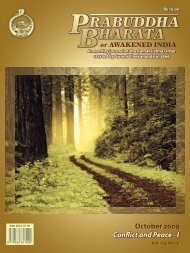According
August 2009 - Advaita Ashrama
August 2009 - Advaita Ashrama
- No tags were found...
You also want an ePaper? Increase the reach of your titles
YUMPU automatically turns print PDFs into web optimized ePapers that Google loves.
others into a display of supposed knowledge. Plato’s<br />
aim is to bring out the characteristics of a state governed<br />
by ‘philosopher kings’ and based on principles<br />
of the highest truth. The use of dialogues to<br />
generate an understanding of difficult philosophic<br />
insights was common in India as well. We have Sri<br />
Krishna instructing Arjuna in the Bhagavadgita<br />
and Yama answering Nachiketa’s questions in the<br />
Katha Upanishad, to give two examples.<br />
The Allegory of the Cave<br />
In the interest of clarity and ready reference I would<br />
like to reproduce here the beginning of Chapter vii<br />
of the Republic.<br />
PB August 2009<br />
Plato’s Allegory of the Cave: A Vedantic Reading 33<br />
And now, I said, let me show in a figure how far our<br />
nature is enlightened or unenlightened: Behold!<br />
human beings living in an underground den, which<br />
has a mouth open towards the light and reaching<br />
all along the den; here they have been from their<br />
childhood, and have their legs and necks chained<br />
so that they cannot move, and can only see before<br />
them, being prevented by the chains from turning<br />
round their heads. Above and behind them a fire is<br />
blazing at a distance, and between the fire and the<br />
prisoners there is a raised way; and you will see, if<br />
you look, a low wall built along the way, like the<br />
screen which marionette players have in front of<br />
them, over which they show the puppets.<br />
I see.<br />
And do you see, I said, men passing along the<br />
wall carrying all sorts of vessels, and statues and<br />
figures of animals made of wood and stone and<br />
various materials, which appear over the wall?<br />
Some of them are talking, others silent.<br />
You have shown me a strange image, and they<br />
are strange prisoners.<br />
Like ourselves, I replied; and they see only their<br />
own shadows, or the shadows of one another, which<br />
the fire throws on the opposite wall of the cave.<br />
True, he said; how could they see anything but<br />
the shadows if they were never allowed to move<br />
their heads?<br />
And of the objects which are being carried in<br />
like manner they would only see the shadows?<br />
Yes, he said.<br />
And if they were able to converse with one another,<br />
would they not suppose that they were naming<br />
what was actually before them?<br />
Very true.<br />
And suppose further that the prison had an<br />
echo which came from the other side, would they<br />
not be sure to fancy when one of the passers-by<br />
spoke that the voice which they heard came from<br />
the passing shadow?<br />
No question, he replied.<br />
To them, I said, the truth would be literally<br />
nothing but the shadows of the images.<br />
That is certain.<br />
And now look again, and see what will naturally<br />
follow if the prisoners are released and disabused<br />
of their error. At first, when any of them is<br />
liberated and compelled suddenly to stand up and<br />
turn his neck round and walk and look towards<br />
the light, he will suffer sharp pains; the glare will<br />
distress him, and he will be unable to see the realities<br />
of which in his former state he had seen the<br />
shadows; and then conceive some one saying to<br />
him, that what he saw before was an illusion, but<br />
that now, when he is approaching nearer to being<br />
and his eye is turned towards more real existence,<br />
he has a clearer vision—what will be his reply?<br />
And you may further imagine that his instructor<br />
is pointing to the objects as they pass and requiring<br />
him to name them—will he not be perplexed?<br />
Will he not fancy that the shadows which he formerly<br />
saw are truer than the objects which are now<br />
shown to him?<br />
Far truer.<br />
And if he is compelled to look straight at the<br />
light, will he not have a pain in his eyes which will<br />
make him turn away to take refuge in the objects<br />
of vision which he can see, and which he will conceive<br />
to be in reality clearer than the things which<br />
are now being shown to him?<br />
True, he said.<br />
And suppose once more, that he is reluctantly<br />
dragged up a steep and rugged ascent, and held<br />
fast until he is forced into the presence of the sun<br />
himself, is he not likely to be pained and irritated?<br />
When he approaches the light his eyes will be dazzled,<br />
and he will not be able to see anything at all<br />
of what are now called realities.<br />
Not all in a moment, he said.<br />
He will require to grow accustomed to the<br />
sight of the upper world. And first he will see the<br />
shadows best, next the reflections of men and<br />
473
















